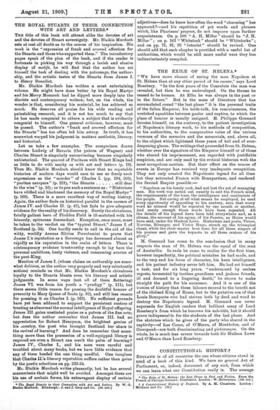THE ROYAL STUARTS IN THEIR CONNECTION WITH ART AND LETTERS.*
THE tide of this book will attract alike the devotee of art and the devotee of Stuart sovereignty. Mr. Blaikie Murdoch sets at rest all doubt as to the source of his inspiration. His work is the "expression of frank and avowed affection for the Stuarts and those whosupported them." The introductory pages speak Of the plan of the book, and if the reader is fortunate in picking his way through a lavish and elusive display of motifs, he will find that the author has set himself the task of dealing with the patronage, the author- ship, and the artistic tastes of the Stuarts from James I. to Henry Benedict.
Mr. Blaikie Murdoch has written a most entertaining volume. He might have done better by his Royal Martyr and his Merry Monarch had he dipped more deeply into the diarists and contemporary writers; but, on the whole, the wonder is that, considering his material, he has achieved so much. He deserves all praise for his . wide reading and painstaking research, and it is not too much to say that he has made congenial to others a subject that is evidently congenial to himself. One general criticism, however, must be passed. The author's "frank and avowed affection for the Stuarts" has too often. led him astray. In truth, it has somewhat warped his judgment in matters aesthetic, literary, and historical.
Let us take a few examples. The comparison drawn between Ludwig of Bavaria (the patron of Wagner) and Charles Stuart is singularly unconvincing because singularly unhistorical. The quarrel of Puritans with Stuart Kings had as little to do with 'sanity as with art and letters (p. 19). Then Mr. Blaikie Murdoch should know that no reputable historian of modern days would care to use so freely such expressions as the " murder " of Charles I. (pp. 194, 203),
"puritan usurpers" (p. 221), "the Stuarts still dear to the wise" (p. 16) ; or to pen such a sentence as : "Historians have vilified and blackened the memory of the Royal Martyr" (p. 160). There is a more excellent way of writing history. Again, the author finds an historical parallel in the careers of James IV. and Charles II. (p. 47), but fails to give adequate eVidence for the reality of his discovery. Surely the chivalrous, fatally gallant hero of Fledden Field is ill-matched with his leisurely, epieurean descendant. Exception, once more, !mist. be taken to the verdict on the "typical Stuart," James I. of Scotland (p. 34). One hardly needs to call in the aid of the witty, `worldly • Aeneas Silvius Piccolomini to prove that James L's reputation as a Sovereign has decreased almost as rapidly as his reputation in the realm of letters. There is cdiitemporary evidence trustworthy enough to lay bare the personal ambitions, hasty violence, and consuming avarice of the poet-King.
Mention•of James I. (whose claims on authorship are some- what dubious, as the author very properly and very reluctantly notices) reminds us that Mr. Blaikie Murdoch's chivalrous loyalty to the Stuarts blunts even his literary and artistic judgments. In some ways (not all of them flattering) James VI. was from his youth a " prodigy " (p. 111), but there seems little reason for passing the doubtful honour of precocity to Mary Queen of Scots (p. 82), and still less reason for pressing it on Charles I. (p. 163). No sufficient grounds have yet been adduced to support the persistent custom of treating as abnormal the normal intelligence of Royal offspring. James III. gains unstinted praise as a patron of the fine arts; but does the author remember that James III. had no
appreciation for Robert Henryson, the brightest genius of his Jountry, the poet who brought Scotland her share in the revival of learning P And does he remember that some- thing more than the possession of a well-equipped library is required ere even a Stuart can merit the palm of learning ? James IV., Charles L, and his sons were careful and troubled about Many books, but we have little evidence that any of them heeded the one thing needful. One imagines
that Charles literary reputation suffers rather than gains by the poetic selections on pp. 233-34.
Mr. Blaikie Murdoch writes•pleasantly, but he has several mannerisms that might well be avoided. Amongst these are his nee of archaic forms, his extravagant display of certain
it-The Royal Stuarts in their Connection with Art and Letters. By W. G. Mattis Murdoch. Edinburgh: J. and .7. Gray and Co. Os. net.]
adjectives—does he know how often the word " charming " has appeared P—and his repetition of pet words and phrases which, like Pharisees' prayers, do not improve upon further acquaintance. On p. 108 "A. H. Millar" should be "J. H. Millar " ; on p. 161 " Whitelock" should be " Whitelocke" ; and on pp. 71, 91, 93 "lutenist" should be revised. ' One should add that each chapter is provided with a useful list of authorities, which would be still more useful were they less indiscriminately compiled.






































 Previous page
Previous page